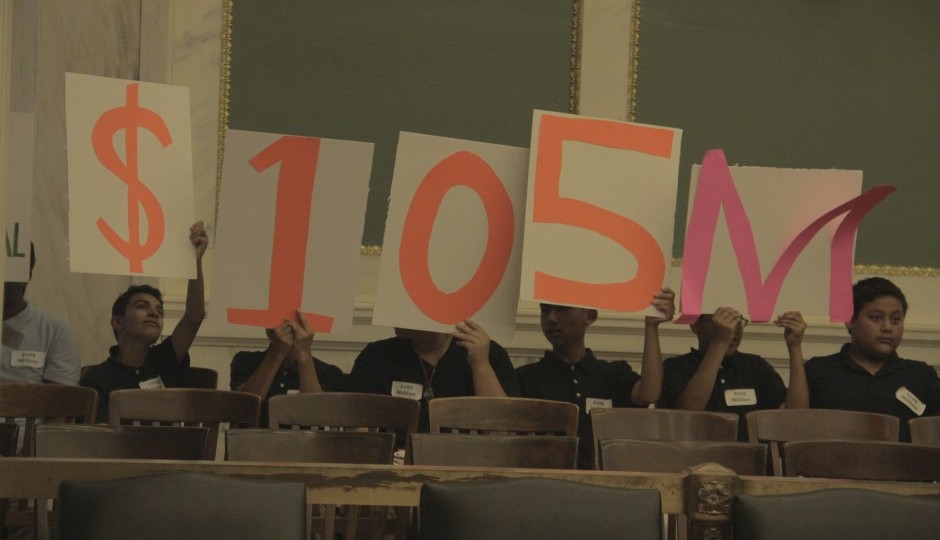5 Questions About the Future of Philly’s Schools

Earlier this year, students made a modest request of City Council. | Photo Credit: City Council’s Flickr
Philadelphia City Council did something Thursday that it’s done a lot in recent years: voted to increase both taxes and education funding. Lawmakers expect to raise an extra $70 million for the city’s schools by hiking the property, parking and use-and-occupancy levies.
So, where does that leave the school district? Somewhat better off than it was before, no doubt. But it’s not out of the woods yet, either. Its future depends on the answers to these five big questions, which we should learn in the coming weeks:
1. Will the schools actually get $70 million from the city?
Right now, the school district is only getting an extra $45 million from the city for sure, though the full $70 million will very likely come through. Here’s the deal: On Thursday, Council passed tax increases that would provide an additional $45 million to the schools directly; the remaining $25 million will first be sent to the city, and lawmakers have promised that will in turn be given to the schools … sometime in the fall.
Why the hold-up? Council members are concerned about the school district’s long-term fiscal challenges as well as its plans to possibly outsource nurses and substitute teachers. Jane Roh, a spokesman for Council President Darrell Clarke, said that “questions to the district about these matters have gone unanswered.”
Clarke has not specified what, exactly, the district needs to do to get these extra funds — and district officials say they don’t know what the strings are, either. Clarke said on Thursday, “We need to sit down. There may have to be some sort of a reorganization strategy with respects to how the school district operates, clearly with the state at the table.” Clarke introduced a bill Thursday to transfer the remaining $25 million to the district, but Council is now going on its summer recess. It could theoretically hold a meeting over the summer to give the schools the extra money, but that seems unlikely. So, as lawmakers have said, they will probably do that in the fall.
2. Could the schools get more than $70 million from the city?
Council also passed a bill Thursday that lawmakers said would make it easier for the city to sell tax liens on commercial properties. Clarke believes that it could enable the city to raise as much as $30 million in additional funds for the school district.
But there are a lot of questions about the accuracy of that number. A spokesman for Mayor Michael Nutter’s administration, which is responsible for selling the liens, has said it is “too speculative” to estimate how much the city will raise in a sale.
And Fernando Gallard, a spokesman for the school district, said that a lien sale might be a wash anyway. That’s because the district is already betting on getting $63 million from the city’s improved delinquent tax collections. Gallard said “that could mean, at the end of the process, there’s going to be no actual gain in revenues for the school district” from lien sales.
3. Will there be layoffs?
The school district has an $85 million budget shortfall. As long as city and state lawmakers cover that, the district will not lay off any employees.
Council has already come through with an extra $45 million, and it’s promising that it will give the additional $25 million to the schools in the future. In Harrisburg, Democrat Gov. Tom Wolf has proposed giving the district an extra $184 million. And while the General Assembly is controlled by Republicans who haven’t exactly delivered for the city’s schools in the past, this year is different. Nearly every political analyst believes that the state will end up boosting funding for education.
So it seems very, very likely that the district will fill its $85 million gap. The question is when it will fill it. State lawmakers are supposed to pass a budget by June 30th, but they have missed that deadline repeatedly in past years. Right now, Wolf and GOP leaders still seem pretty far apart on budget priorities.
The School Reform Commission, too, has to pass a budget by June 30th. Will it count on getting all $70 million from the city, or just $45 million? If it goes with the latter option, the district may have to lay off employees. The same applies if the SRC doesn’t trust that the state will deliver at least some extra money.
In other words, layoffs could happen. But if they do, they’ll probably be temporary.
4. Will Harrisburg, like, actually invest in city schools?
School districts around the state have been struggling for years now, to the point that even conservative lawmakers are paying attention. And the most important issue in the 2014 gubernatorial race was education. So analysts believe that Wolf will get extra funding for schools in Philadelphia and beyond.
But the question is: how much? Will it be enough to cover the Philadelphia School District’s budget gap and little else, so that the city’s schools are stuck with the same inadequate resources they have today? Or will it be enough to actually invest in the school district for once? The answer to that question depends, in part, on the answer to the next question.
5. Will there be strings attached to more state funding?
If the GOP is going to give Wolf the huge boost in education spending he wants, there will be tradeoffs. Big, massive tradeoffs. That could mean privatizing the state-controlled liquor system. Or overhauling the state’s pensions. Or converting lots of traditional public schools into charters. Will Democrats accept those strings? Will Philadelphia’s C-team delegation accept the strings? We’ll find out soon.